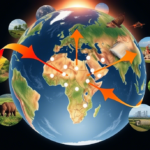Political Science
- Home
- Political Science


- President Donald Trump is making full use of his pardon power. This year, Trump has issued roughly 1,800 pardons, or nearly six times the number he issued during the four years of his first term. Granted, about 1,500 of them involved individuals charged for their role in the Jan. 6, 2021, assault on Congress. Still, the pace of Trump's pardons this year has been nearly unprecedented.
- Across the world, governments are tightening controls on speech, expanding surveillance and rolling back rights once thought to be secure.
- When engaging in a political discussion, talking about what you oppose instead of what you support may make others more open to your views, according to research published by the American Psychological Association.
- Global human rights are in decline according to the findings of a recent study by researchers at the University of Rhode Island's Center for Nonviolence and Peace Studies.
- The U.S. Supreme Court is currently reviewing a case to determine whether President Donald Trump's global tariffs are legal.
- Across the world, democracies are grappling with a widening gap between citizens and those who govern. Australia is no exception.
- People who lean politically to the right are more likely to fall for conspiracy theories than those on the left—but not for other types of false or misleading information. And regardless of ideology, we tend to accept political claims that align with our own beliefs. This is shown in a doctoral thesis from Linköping University, Sweden.
- Societal and behavioral shifts, including growing recognition of children displaying harmful sexual behaviors and links to extremism, violence and financial scams are driving child sexual exploitation and abuse online, according to a new report.
- Online discussions are often dominated by a small group of active users, while the majority remain silent. This imbalance can distort perceptions of public opinion and fuel polarization.
- It shouldn't come as a surprise that the Oxford Dictionary has named "rage bait" its Word of the Year. The quantity of live-streamed drama in 2025 has made it clear that outrage is now fueling much online content.
- Gen Z views the world as a scary place, according to new research presented at the 2025 Society for Risk Analysis Conference.
- A multi-institution research team has conducted a multi-year study to better understand how extended and repeated stays in solitary confinement impact prisoners both physically and psychologically.
- The COVID-19 pandemic prompted a nationwide conversation in the U.S. about how much people trust scientists and trained medical professionals. But for some communities, distrust has been the norm.
- Researchers have developed a method to detect the destruction of buildings using freely available satellite radar imagery. Daniel Racek and colleagues' algorithm analyzes publicly available Sentinel-1 synthetic aperture radar images from the European Space Agency to identify destroyed buildings in conflict zones. The study is published in the journal PNAS Nexus.
- As the U.S. government turns its attention to drug cartels in Mexico, new research from the University of California, Davis, suggests that violent competition among criminal organizations increases the risks migrants face at the northern border.
- Threats relating to technology, disinformation, economic security and foreign interference are overshadowing traditional security concerns in Australians' minds, according to data released by the Australian National University National Security College.
- Most Americans imagine human trafficking as a violent kidnapping or a "stranger danger" crime—someone abducted from a parking lot or trapped in a shipping container brought in from another country.
- About 70% of Americans voted in person in the 2024 presidential election, their ballots counted by machines called Precinct Count Optical Scanners (PCOS). Researchers at Towson University have systematically analyzed thousands of ways that PCOS machines could have process or security vulnerabilities—with the goal of helping local officials identify and mitigate those risks.
- In early 2025, in an effort to facilitate its deportation goals, the Trump administration entered into hundreds of agreements with local police departments to essentially deputize them to act as federal immigration agents.
- There is no such thing as a society where everyone is equal. That is the key message of new research that challenges the romantic ideal of a perfectly egalitarian human society.
Photographer:








